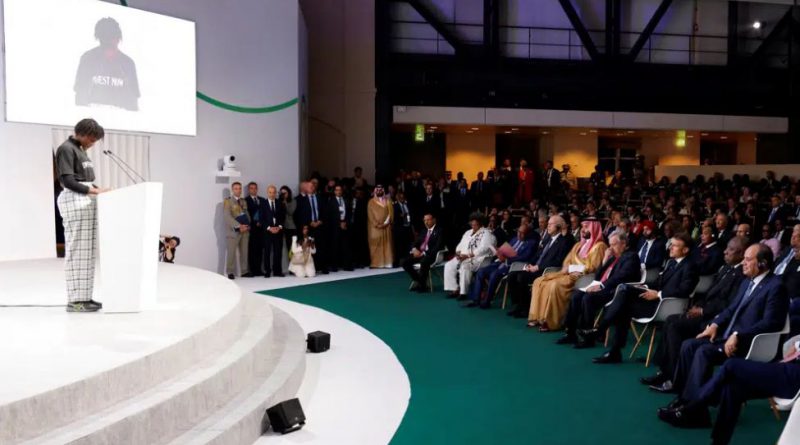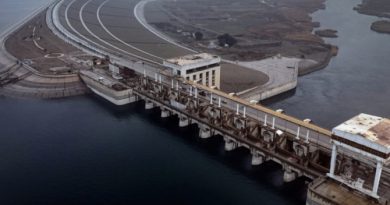Climate activist Nakate urges rich countries to cancel debt, grant climate finance at Paris summit
Paris (AP) — Facing an audience packed with world leaders and finance officials in suits, Ugandan climate activist Vanessa Nakate silenced the room, then made everyone listen to some uncomfortable facts.
Speaking at a two-day summit aimed at seeking better responses to tackle poverty and climate change issues by reshaping the global financial system, the UNICEF ambassador and campaigner was in a somber mood and asked for a moment of silence.
Dressed in a black t-shirt with the slogan “Divest Now,” Nakate said the silence was for “people around the world who are already suffering, starving, being displaced, dropping out of school, being forced into child marriages, losing their cultures and history, those who are already helpless, hopeless and dying due to the devastating impact of the climate crisis.”
Speaking right after summit host French President Emmanuel Macron, Nakate then urged delegates to put people first instead of profits, to make polluters pay, to cancel debt and direct climate finance toward the most vulnerable countries that did not create the climate crisis, while making sure fossil fuels are not part of their development.
“You must be thinking in trillions, not billions,” she said, punctuating her speech with depressing statistics about pollution and the world’s growing inequalities between the rich and the have nots.
Macron called for massive investment for developing countries in his address, saying that no country should have to choose between “reducing poverty or protecting the planet.”
The summit is bringing together more than 50 heads of state, world finance officials and activists. They will discuss ways of reforming the global financial system and address the debt, climate change, and poverty crises.
Macron called for a “financing jolt,” insisting on the need for more investment from both the public and private sectors, and the crucial role played by international institutions.
Macron praised the International Monetary Fund’s initiative to allocate more funds to low-income countries through Special Drawing Rights, which are an IMF international reserve asset that can be exchanged for hard currency.
The Paris talks also come as the COVID-19 pandemic, the war in Ukraine and a global debt crisis have led to a drop in life expectancy and an increase in poverty in most countries around the world, the United Nations Development Program reported.
Developing nations point to an outdated system where the United States, Europe, China and other big economies that have caused most climate damage are leaving the poorest countries to deal with the consequences.
Amid key topics to be discussed in Paris are changes needed in the way the World Bank and the International Monetary Fund are lending and granting money to the most vulnerable countries. Both institutions have been criticized for not factoring climate change into lending decisions and being dominated by wealthy countries like the U.S.
“The international financial system is in crisis,” said U.N. Secretary-General Antonio Guterres. He praised the Special Drawing Rights initiative, but criticized how funds were allocated, with the European Union receiving $160 billion to Africa’s $34 billion.
“A European citizen received on average almost 13 times more than an African citizen. All this was done according to the rules. But let’s face it: these rules have become profoundly immoral,” he said.
The Paris summit comes in the wake of a plan championed by Barbados Prime Minister Mia Mottley to ease access to financing for climate-vulnerable countries. Mottley and other proponents have argued that developing countries are forced to pay such high interest rates that they struggle to finance adaptation projects, like sea walls, or green energy initiatives, like large solar farms, or simply make payments on outstanding loans when climate-infused disasters strike.
“What is required of us now is absolute transformation — and not reform — of our institutions,” Mottley said.
“I hope that we leave Paris therefore not only secure in our determination to protect the planet, to protect the biodiversity, to protect people, but to recognize that if we do not act today, at scale, with pace, we will not be able to get there in time to save more people,” Mottley said.
Activists fear the talks won’t meet expectations.
“The current financial system does not just need a bandage, it needs an intensive surgical intervention,” said Harjeet Singh, head of global political strategy at Climate Action Network International.
“There are some good ideas on the table,” he noted, “but I must mention that they don’t really go far enough.”
The Paris summit has no mandate to make formal decisions, French organizers stressed, but it aims to give a strong political impetus to key issues to be discussed in upcoming climate conferences and other international meetings.
Climate activists and developing nations also urge rich countries to deliver on their existing commitments.
Macron tweeted Thursday that experts said the pledge to provide poor nations with $100 billion in aid each year to tackle global change “is very likely to be met this year!” First made in 2009 and reaffirmed at the 2015 Paris climate summit, the promise has never been fulfilled.
Summit participants could back a tax on the greenhouse gas emissions produced from international shipping, with the aim to enable its adoption at a July meeting of the International Maritime Organization.
To bring more money in, activists are pushing for a tax on the fossil fuel industry and another one on financial transactions — two proposals that appear to have little support from wealthier nations.
Debt restructuring and cancellation are also to be debated, as a growing number of countries are struggling with unsustainable debt aggravated by climate change issues.
Participants were to discuss a debt suspension clause for countries hit by extreme climatic events. Yet it would have no impact on existing debt, activists note.
Forty heads of state and government are slated to attend the summit, many from poor and climate-vulnerable nations. Only two are members of the Group of Seven most developed countries — Macron and German Chancellor Olaf Scholz. The U.S. is represented by Treasury Secretary Janet Yellen and climate envoy John Kerry.
Attendees include China’s Prime Minister Li Qiang, Brazil’s President Luiz Inácio Lula da Silva, European Commission President Ursula von der Leyen, World Bank head Ajay Banga and IMF President Kristalina Georgieva.


